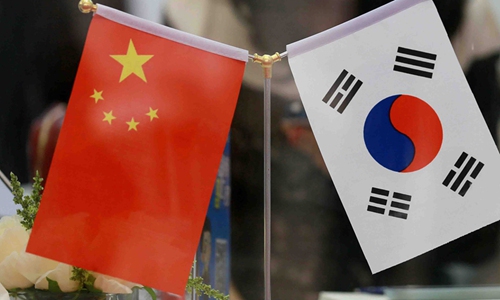
A person making kimchi Photo: CFP
South Korea's imports of kimchi in the first quarter was six times of the country's total quarterly exports of kimchi, which set a new record for kimchi's quarterly export.
The rising demand for kimchi from China manifests that China and South Korea could further work jointly to achieve a sustainable cooperation that will also accelerate the recovery of the regional economy in Northeast Asia, according to an expert.
South Korea imported 67,940 tons of kimchi in the first quarter which all came from China, the guancha.cn reported on Wednesday, citing data from the Korea Customs Service. In the country's total kimchi consumption, imported kimchi accounts for about 35 percent, media reported.
Kimchi made in China has a strong advantage over Kimchi made in South Korea due to the low price of cabbage, Li Tianguo, associate professor at the National Institute of International Strategy, told the Global Times on Wednesday, adding that many South Korean restaurants are more willing to use high-quality and inexpensive kimchi from China.
As a result, Korean demand for kimchi made in China is growing..
China and South Korea need to work jointly and continue to explore effective ways to complement each other and achieve a sustainable cooperation, Li added, noting that China and South Korea are continuing to carry out the second-phase talks on the China-South Korea Free Trade Agreement and are starting to plan for the development of China-South Korea economic and trade relations in the upcoming five years.
Such actions will further deepen the economic and trade ties between the two nations and accelerate the recovery of the regional economy in Northeast Asia, Li noted.
The economic and trade cooperation between China and South Korea becomes even more important as the ongoing pandemic poses a major challenge to economic growth in Northeast Asia and across the world, Li said.
South Korea's exports of kimchi reached an all-time high in the first quarter of the year, Yonhap cited data from the Korea Customs Service and industry sources on Wednesday, noting that overseas shipment of kimchi reached $46.57 million from January to March, a year-on-year increase of 54.3 percent.
Chinese and South Korean netizens have been involved in a cultural spat over "kimchi" in recent months. The dispute over kimchi represents different voices from the two countries on culture, but it does not affect consumers' actual purchasing choices and ordinary South Korean consumers still prefer purchasing high-quality products with affordable prices, said Li.


